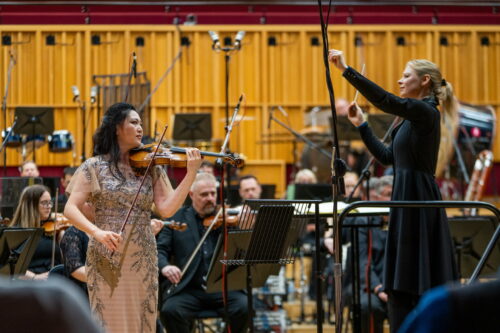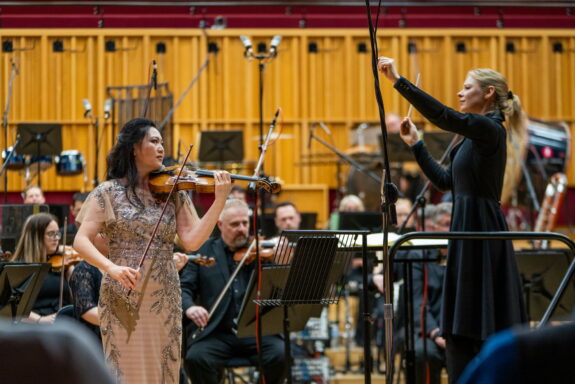 United Kingdom Montgomery, Kats-Chernin, Watkins: Emily Sun (violin), BBC National Orchestra of Wales / Gemma New (conductor). Hoddinott Hall, Millennium Centre, Cardiff, 24.10.2024. (PCG)
United Kingdom Montgomery, Kats-Chernin, Watkins: Emily Sun (violin), BBC National Orchestra of Wales / Gemma New (conductor). Hoddinott Hall, Millennium Centre, Cardiff, 24.10.2024. (PCG)

Jessie Montgomery – Coincident Dances (2017), UK premiere
Elena Kats-Chernin – Fantasie im Wintergarten (2022), UK premiere
Huw Watkins – Symphony No.2 (2020-2021)
Jessie Montgomery (b.1981) in her online note describes the Coincident Dances, receiving the UK premiere here, as a depiction of New York through an ‘aural palette’ which combines very different styles of music; she engagingly called some of them ‘merely experiments’. That might suggest a random collage somewhat on the lines of Charles Ives, but the results were surprisingly different. The individual strands – beginning with a double bass solo which Alex Jones delivered engagingly – were carefully delineated and audible, and combined with careful skill and good taste. The shifting patterns evoked in turn the worlds of Respighi, Tippett and Copland in his early country and western phase. A Louis-Armstrong-like jazz riff – scorchingly played by trumpeter Philippe Schartz – led to the anticipated Ives synthesis, where multiple layers contended for mastery. This eventually gave way to a repeated riff, like the fadeout on the 1960s pop track, before it stopped abruptly mid-phrase with the suggestion that the composer could happily have gone on for another ten minutes if she had wanted to.
The Fantasie im Wintergarten by Elena Kats-Chernin (b.1957) is effectively a violin concerto in three distinct movements in the classical style. Despite the German title, the programmatic elements were barely discernible. Even so, the composer’s online note talked of ‘a tragic tale of love and betrayal that takes place inside the world of the fairground and the circus’. The music told rather of smoky Buenos Aires nightclubs and bars in the tango era and was no less effective for that. The opening, with its jaunty castanets, certainly suggested the atmosphere of Latin America. The whole first movement went with an undeniable swing which must surely have captured the imagination of every listener. The smooth and rich harmonies of the second movement supported a lyrical solo line. Emily Sun spun it out exquisitely into an utterance of deceptive beauty which overlayed a disturbing sub-current. The finale too had its share of disruptive elements, such as a delightfully vulgar trombone interruption, although the sheer virtuosity of the writing for the soloist triumphed over all. This was quite simply an extended modern violin concerto of stunning impact.
I am not at all surprised that, after the first performance in April 2023 with the Adelaide Symphony Orchestra, Sun has already issued a recording of the work on the ABC label. (Paul Jackson has already reviewed the disc here on MusicWeb International. He praised the work and announced today’s concert performance.) Her playing is stunning. She has the strength and body to command the orchestra during the louder passages – and the orchestration is often very loud – yet at the same time she sweetly soars over them without ever losing focus. Her stupendous delivery of the cadenza was matched by her virtuosity in an adventurously chosen encore, Matthew Hindson’s The Big 5-0, which she introduced to the audience. This is another sparkling piece that I would like to hear again, although I cannot discover if it has ever been recorded.
Following the interval, Huw Watkins (b.1976) had a hard task matching the effect of the concerto with his Second Symphony, which Mark Elder and the Hallé Orchestra premiered in 2021 during the pandemic. But this was one of his most impressive scores, a work in three distinct movements which portrayed a real sense of struggle and grandeur. The opening, with cells of themes in the woodwind tumbling over each other, slowly generated an inexorable sense of threat and drama; the contrasts startlingly recalled Ernest J. Moeran’s techniques in a build-up towards the climax. In the central section, contrast was provided by a lyrical oboe solo, beautifully played by Steve Hudson; the melody was then taken up by soaring violins to superb effect. Similarly lush string harmonies in the second movement were initially contrasted with more acerbic woodwind phrases, but the two gradually combined in a rich synthesis. The influence of Vaughan Williams in his most spiritual mood was never far away; and again we heard a plangent oboe solo. The finale was perhaps more conventionally modern, with dramatic contrasts leading to a sense of triumph. But then, after an almost bombastic C major climax, we suddenly entered a new world of doubt: the coda only slowly regained an ‘upward rush of optimism’, to quote from the composer’s online note. After a whole succession of Watkins’s works which cut off in mid-phrase, this more positive, but still surprisingly abrupt, conclusion was welcome. The symphony as a whole is a major addition to his catalogue of works.
I have not yet mentioned the contribution of New Zealand conductor Gemma New; this is most unjust and unfair. She controlled all the works – many of which rushed along at a considerable pace with the threat of disaster at every corner – with a tact and sense of proportion which clarified the textures of the music admirably. I note from her biography that she specialises in modern music, but I would also welcome the chance to hear her interpretation of more traditional fare. She and Emily Sun made a formidable partnership in Kats-Chernin’s concerto.
The concert is scheduled for broadcast by BBC Radio 3 at an unspecified date either on Classical Live (presumably as an evening concert) or on their New Music Show. I would hope it would receive greater prominence than the latter, which has tended over the years to become something of a ghetto for music which lacks the potential for popular appeal. In his review, Paul Jackson observed that ‘the work may be too quirkily unsettling to enter the standard repertoire’. I must disagree. All of these works deserve a wider hearing, but I have little doubt that the Fantasie will in due course receive precisely that.
The summer of 2024 has been a quite horrendous period for classical music in South Wales, compounding the continuing closure of St David’s Hall. Welsh National Opera had been first threatened by swingeing cuts in their touring budget from Arts Council England. They were then menaced by a plan contrived by their Welsh equivalents and WNO management to further reduced budgets by consigning the company to part-time status. Attendees at performances this autumn will have been confronted by picket lines of singers and orchestral players objecting to the proposals. At the time of writing, however, there is hope that some compromise can be reached with a new WNO management board. At the same time, the long-running Vale of Glamorgan Festival, with its brave policy of featuring music by living composers – already suffering from financial constraints and severely hit by the pandemic – finally gave up the ghost. This leaves the BBC as the only body in South Wales to feature new classical music regularly in their programmes.
Paul Corfield Godfrey

This was a thoroughly enjoyable concert. People who dismiss contemporary music out of hand don’t know what they’re missing.
The only downside was the BBC’s refusal to supply printed programmes. Programmes are especially useful when all the music is unfamiliar. We were urged to access digital notes instead, but only an inconsiderate oaf would use a smartphone during a concert. The BBC should think again.